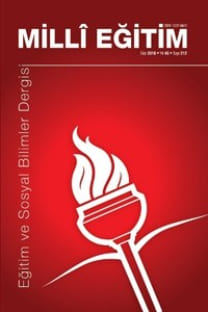PEDAGOJİK ALAN BİLGİSİ ÇALIŞMALARININ DERLENMESİ: FEN BİLİMLERİ EĞİTİMİ ÖRNEĞİ
Pedagojik Alan Bilgisi, Fen Bilimleri Eğitimi, Alan Yazın Taraması
___
- Aydın, S., & Boz, Y. (2012). Fen öğretmen eğitiminde pedagojik alan bilgisi araştırmalarının derlenmesi: Türkiye örneği. Kuram ve Uygulamada Eğitim Bilimleri, 12(1), 479-505.
- Aydın, S., Demirdöğen, B., Tarkın, A., Kutucu, S., Ekiz, B., Akın, F. N., Tuysuz, M., & Uzuntiryaki, S. (2013). Providing a set of research-based practices to support preservice teachers’ longterm Professional development as learners of science teaching. Science Education, 97, 903-935.
- Abell, S. K. (2007). Research on science teacher knowledge. In S. K. Abell & N.G. Lederman (Eds.), Handbook of Research on Science Education (pp. 1105-1149). Mahwah, NJ: Lawrence Erlbaum.
- Abell, S. K. (2008). Twenty years later: Does pedagogical content knowledge remain a useful idea?International Journal of Science Education, 30, 1405-1416.
- Bahcivan, E., & Cobern, W. W. (2016). Investigating coherence among Turkish elementary science teachers’ teaching belief systems, pedagogical content knowledge and practice. Australian Journal of Teacher Education, 41(10), 62-86.
- Borko, H., Cone, R., Russo, N. A., & Shavelson, R. J. (1979). Teachers’ decision making. In P. Peter- son & H. Walberg (Eds.), Research on teaching: Concepts, findings and implications (pp. 136-160). Berkeley, CA: McCutchan.
- Chan, K. K. H., & Hume, A. (2019). Towards a consensus model: Review of how science teachers’ pedagogical content knowledge is investigated in empirical studies. In A. Hume, R. Coo- per & A. Borowski (Eds.), Repositioning pedagogical content knowledge in teachers’ knowledge for teachng science (pp. 3-76). Singapore: Springer.
- Davis, E. A. (2003). Knowledge integration in science teaching: analysing teachers’ knowledge development. Research in Science Education, 34(1), 21-53.
- De Jong, O., & van Driel, J. (2001). The development of prospective teachers’ concerns about teaching chemistry topics at a macro-micro-symbolic interface. In H. Behrednt, H. Dahncke,R. Duit, W. Graber, M. Komorek, A. Kross, & P. Reiska (Eds.), Research in science education: past, present and future (pp. 271-276). Dordrecht: Kluwer.
- Demirdöğen, B., Hanuscin, D. L., Uzuntiryaki-Kondakçı, E., & Köseoğlu, F. (2016). Development and natüre of preservice chemistry teachers’ pedagogical content knowledge for nature of science. Research in Science Education, 46, 575-612.
- Friedrichsen, P., van Driel, J. H., & Abell, S. K. (2011). Taking a closer look at science teaching orientations. Science Education, 95, 358-376.
- Gess-Newsome, J. (1999). Pedagogical content knowledge: An introduction and orientation. InJ. GessNewsome & N. G. Lederman (Eds.), Examining pedagogical content knowledge: The construct and its implications for science education (pp. 95-132). Boston: Kluwer.
- Gess-Newsome, J. (2015). A model of teacher professional knowledge and skill including PCK: Results of the thinking from the PCK Summit. In A. Berry, P. Friedrichsen,& J. Loughran (Eds.), Re-examining pedagogical content knowledge in science education (pp. 28-42). New York, NY Routledge.
- Grossman, P. (1990). The Making of a Teacher. New York: Teachers College Press.Hart, C. (2001). Doing a literature search: A comprehensive guide for the social sciences. London: Sage. Hume, A., Cooper, R., & Borowski, A. (2019). Repositioning pedagogical content knowledge in teachers’knowledge for teachng science. Singapore: Springer.
- Kind, V. (2009). Pedagogical content knowledge in science education: Perspectives and potential for progress. Studies in Science Education, 45(2), 169-204.
- Loughran, J. J. (2007). Science teacher as learner. In S. K. Abell & N. G. Lederman (Eds.), Handbook of research on science education (pp.1043-1065). New Jersey: Lawrence Erlbaum Associates.
- Magnusson, S., Krajcik, J., & Borko, H. (1999). Nature, sources and development of pedagogical content knowledge for science teaching. In J. GessNewsome & N. G. Lederman (Eds.), Examining pedagogical content knowledge: The construct and its implications for science education (pp.95-132). Boston: Kluwer.
- Miles, M. B., & Huberman, A. M. (1994). Qualitative data analysis: An expanded sourcebook (2nd ed.).Tousand Oaks: Sage Publications.
- Milli Eğitim Bakanlığı (MEB). (2018). İlköğretim Fen Bilimleri Dersi Öğretim Programları. Ankara.
- National Research Council (1996). Nationals Science Education Standards. Washington, DC: Natio- nal Academy Press.
- Park, S., & Oliver, J. S. (2008). Revisiting the conceptualisation of pedagogical content knowledge (PCK): PCK as a conceptual tool to understand teachers as professionals. Research in Science Education, 38(3), 261-284.
- Shulman, L. S. (1987). Knowledge and training: Foundations of the new reform. Harvard Educational Review, 57, 1-2
- Şimşek, N. & Boz, N. (2016). Analysis of pedagogical content knowledge studies in the context of mathematics education in Turkey: A meta-synthesis study. Kuram ve Uygulamada Eğitim Bilimleri, 16(3), 799-826.
- Yıldırım, A., Şimşek, H. (2016). Sosyal Bilimlerde Nitel Araştırma Yöntemleri. Ankara: Seçkin Yayınları .
- ISSN: 1302-5600
- Yayın Aralığı: Yılda 4 Sayı
- Başlangıç: 1973
- Yayıncı: Milli Eğitim Bakanlığı
BİRİNCİ SINIFA BAŞLAMAK İÇİN OKULA BAŞLAMA YAŞI MI OKULA HAZIR OLUŞ MU?
Yılmaz TONBUL, Necati ALTINHAN
Nazıme ÖZGÜR TAMDOĞAN, M. Bahadır AKTAN
EĞİTİM FAKÜLTELERİ ÖĞRETMEN ADAYLARINI DERİNLEMESİNE ÖĞRENEN BİREYLERE DÖNÜŞTÜREBİLİYOR MU?
OKUL ÖNCESİ DÖNEMDE EV ZİYARETLERİ: EV ZİYARETİ GÖZLEM FORMLARINA DAYALI BİR İNCELEME
OKUL ÖNCESİ ÖĞRETMENLERİN ÖZEL ALAN YETERLİK VE ÖZ YETERLİK DÜZEYLERİNİN İNCELENMESİ
